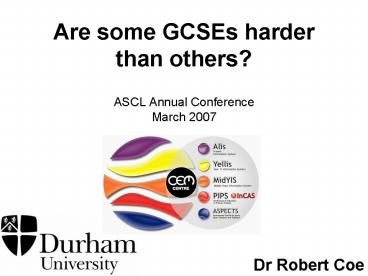Are some GCSEs harder than others - PowerPoint PPT Presentation
1 / 14
Title:
Are some GCSEs harder than others
Description:
From Nuttall et al, 1974, based on 1968 O-Level results from one board ... Severity of grading at A level (Fitz-Gibbon and Vincent, 1994) 2003. John Dunford: ... – PowerPoint PPT presentation
Number of Views:72
Avg rating:3.0/5.0
Title: Are some GCSEs harder than others
1
Are some GCSEs harder than others?
- ASCL Annual Conference
- March 2007
2
Five different methods for estimating grade
severity
From Nuttall et al, 1974, based on 1968 O-Level
results from one board
3
CEM Monitoring Projects (England)
Age
Year
18
13
17
12
16
11
15
10
14
9
13
8
12
7
11
www.cemcentre.org
6
10
5
9
4
8
3
7
2
6
1
5
R
PIPS Baseline
4
N
ASPECTS
3
4
Regression segments
5
Yellis rainbow wallchart
6
Severity of grading at A level (Fitz-Gibbon and
Vincent, 1994)
7
2003
- John Dunford
- It's a consequence of people perceiving that
maths, physics, chemistry and modern foreign
languages are harder subjects. Since most
university courses do not require particular
subjects, an A or a B in psychology is worth the
same. - Statistically its easy to show that psychology
is an easier A-level than maths. It is incredibly
worrying ... we are producing a nation of
psychologists when the country desperately needs
scientists and linguists. - It's a hidden scandal.
- David Milliband
- Every A-level subject meets rigorous standards
and several international panels have shown this
to be true. - Ken Boston
- There is no such thing as an 'easy' A-level
- Psychology A-level questions
- Critically consider whether multiple
personality disorder (dissociative identity
disorder) is an iatrogenic or spontaneous
phenomenon. - Compare and contrast two or more explanations
of one anxiety disorder.
8
My analysis
- National dataset all GCSEs taken in 2004
(625,000 students) - Rasch model
- treats different subjects as indicators of a
common trait (general academic ability) - What level of general academic ability
corresponds to each grade in each subject? - 34 subjects included
- GNVQs failed to fit
- Creative subjects failed to fit (music, art,
perf. stds) - Grade U did not fit
9
Results
10
Gender bias in different subjects
11
Problems with statistical approaches to
comparability
- Other factors statistical differences may arise
from many things other than difficulty (eg
teaching, special interests) - Multidimensionality different examinations
measure different things so cant be equated - Unrepresentativeness statistical samples are
unrepresentative of those who take (or might
take) a subject - Subgroup differences relative difficulties
vary by subgroup - Inconsistency different statistical methods
dont agree - Forcing equality anomalous distributions and
changeover difficulties would arise from making
grades comparable and which definition of
comparability would be privileged?
12
Conclusions (1)
- Are some subjects harder than others?
- Yes, if by harder we mean that the same grade
corresponds to different levels of general
academic ability - But some subjects/examinations are not a good
indication of general academic ability - The differences are big
- Spanish, French, German are overall about a grade
harder than drama, textiles, child development - Grade F in Spanish, IT or history is almost the
same as a D in textiles, PE or drama - Rank order of difficulty depends a lot on which
grade you are looking at - At A and A, English is harder than history at
F, it is 1.5 grades easier - Correlation between F and A difficulties is 0.0
13
Conclusions (2)
- Gaps between grades are not equal
- Average A-A gap is twice C-D, D-E, E-F
- Difficulty varies for males and females
- Physics 0.5 grade easier for boys
- But subject differences outweigh gender
differences - Grade U is not one grade below G
14
Should we make them all comparable?
- Would delay awarding process
- Grade profiles for some subjects would be skewed
(half Latin candidates would get A) - Which definition of comparability would we use?
- Purely statistical methods lead to some anomalies
- Would destroy comparability over time
- In Australia they avoid all these problems by
scaling































